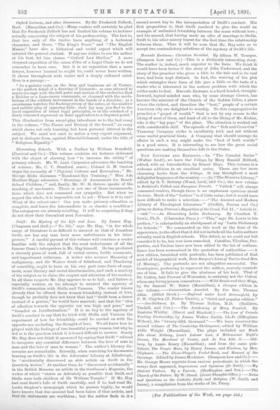Swift : the Mystery of his Life and Love. By
James Hay. (Chapman and Hall.)—" No life," says Mr. Hay, "in the whole range of literature is so difficult to unravel as that of Jonathan Swift, nor has any man been more unfortunate in his inter- preters." A careful perusal of this volume will convince a reader familiar with the subject that the most unfortunate of all the famous Dean's interpreters is Mr. Hay himself. He has produced a slovenly piece of work, full of verbal errors, feeble comments, and impertinent criticisms. A writer who accuses Macaulay of malignancy, and Sir Walter Scott of falsehood, and Thackeray of scurrility, ought to have on his own part some force of argu- ment, some literary and moral discrimination, and such a mastery of his subject as to claim the respect and attention of his readers. In all these respects Mr. Hay appears to us to fail; and failure is especially written on his attempt to unravel the mystery of Swift's connection with Stella and Vanessa. Tho reader knows already that he offered these women friendship instead of love, though he probably does not know that had " Swift been a dunce instead of a genius," he would have married ; and that his " idea of affection towards the opposite sex was high and pure," and " founded on Intellectualism." It is no key to the mystery of Swift's conduct to say that ho tried with Stella and Vanessa the experiment of how far friendship could be carried on with the
opposite sex excluding the thought of love. We all know how he played with the feelings of two beautiful young women, but why he did so is the question which it is found difficult to answer. Surely Mr. Hay does not think it answered by saying that Swift "refused to recognise any essential difference between the love of man to man and the love of man to woman." The author's literary dis- coveries are remarkable. Recently, when searching for documents bearing on Swift's life in the Advocates' Library at Edinburgh, he " accidentally discovered an able article on Swift in the Quarterly Review." At another time, he "discovered accidentally" in the British Museum an article in the Gentleman's Magazine, the writer of which " states as delicately as possible that Swift and Stella were both children of Sir William Temple." If Mr. Hay had read Soott's Life of Swift carefully, and if he had read Mr. Leslie Stephen's monograph which ho praises highly, he would have known that due account had been taken of that article, and that its statements are worthless ; but the author finds in it a second secret key to the interpretation of Swift's conduct. His first proposition is, that Swift resolved to give the world an example of unlimited friendship between the sexes without love ; and his second, that having made an offer of marriage to Stella, Swift to his utter misery learnt for the first time the relationship. between them. Thus it will be seen that Mr. Hay asks us to accept two contradictory solutions of the mystery of Swift's life.


































 Previous page
Previous page